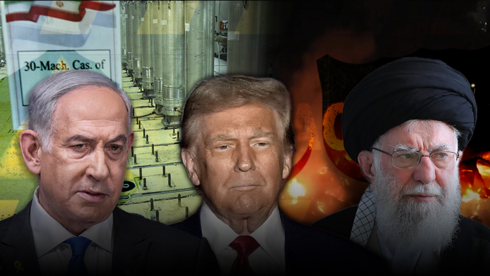Trump signed a renewal of the tough sanctions policy on Tehran: ‘Too close to a nuclear weapon, we will reduce its oil exports to zero’; Netanyahu will try to convince the president to focus on the Iranian threat, but an Israeli official admitted: ‘There is no more talk of an attack, Trump has another goal – one that requires ending the war’
About an hour before the White House meeting between U.S. President Donald Trump and Prime Minister Benjamin Netanyahu, the American president on Tuesday evening signed a renewal of the “maximum pressure” policy against Iran, the name for the heavy sanctions policy he imposed on the Islamic Republic during his first term. Trump said that Iran is too close to a nuclear weapon, and warned that if Tehran decided to assassinate him in response, Iran would be “obliterated.” He said he left “instructions” to do so if Tehran did indeed assassinate him.
The U.S. president was asked whether he intends to assist Netanyahu and give the green light to attack Iran’s nuclear facilities. “I don’t know that he’s going to ask for that. We’ll have a long meeting, we’ll talk about a lot of things. I’ll update when the time comes, but I can’t talk about it right now,” he responded
Trump added: “I would love to have a good relationship, but they must not have nuclear weapons. It will be very tough if they insist on that. A lot of people at the highest levels in Iran do not want nuclear weapons.”
Before Trump’s signing, a U.S. official said the goal is to deny Iran any way to obtain nuclear weapons and combat its “malign influence” – and within the framework of the sanctions the hope is to reduce Iranian oil exports “to zero.”
The Iranian issue is expected to be central – perhaps the most central – issue at the White House meeting with Netanyahu. Trump and Netanyahu will discuss a host of issues that could determine the face of the Middle East in the coming years, including the transition to phase two of the hostage deal, a normalization deal with Saudi Arabia, and dealing with the Iranian threat.
Netanyahu is expected to try to convince Trump that in the order of priorities in the Middle East, it is better and right to start dealing with this threat. He will argue that this will also serve the interests of the Saudis and “give time” to make decisions regarding the Gaza Strip. His critics claim that the prime minister is actually hoping to torpedo phase two of the deal, in the shadow of the fear of the dissolution of his government with the “red lines” of Minister Bezalel Smotrich in the background, who promises to withdraw from the coalition if fighting does not resume at the end of phase one.
Trump did not rule out the possibility of an attack on the nuclear facilities, but he repeatedly signaled that he intended to promote a “deal” – that is, a new nuclear agreement – and noted that “it would be nice” to resolve the crisis with Tehran without an Israeli attack. On Tuesday evening, Trump said that he intended to contact Iranian President Masoud Pezeshkian, adding that he was “torn” while signing the tougher sanctions. “I hope we don’t have to use them a lot, I’m not happy about using them.”
Sanctions are seen by Trump as a way to force Iran to compromise but, at least in the past, this policy has not worked. Former President Joe Biden left Trump’s sanctions in place – although some argue that his administration did not effectively enforce them – and failed to advance a new agreement or save the old one.
US President Donald Trump on Netanyahu: “I’m here to listen, he came to meet me and I’m here to listen”
(Video: Reuters)
Although Israel has talked in recent months about the possibility of an attack o Iran’s nuclear facilities – against the backdrop of assessments that Tehran is weaker than ever, after the crushing of Hezbollah in Lebanon, the overthrow of the Assad regime in Syria, and the Israeli attack on Iran in October, which significantly damaged Iran’s air defense capabilities – it seems that Jerusalem understands that the chances of such a move are now low.
“There is no talk of an attack on Iran,” an Israeli source told the Washington Post Monday night – noting that, after the October attack, Israel had formulated plans for a joint attack with the U.S. against the Iranian nuclear facilities. However, he said the new American administration has “another goal” in the region, one that would demand an end to the fighting, when in fact he meant the idea of a regional arrangement that would perhaps also include normalization with Saudi Arabia.
“Trump is interested in rebuilding Gaza through a regional agreement with the United Arab Emirates and Saudi Arabia,” he noted. “Netanyahu will not go against Trump.” Either way, Israel hopes that, unlike Trump’s first term, this time the new sanctions will be accompanied by a more credible military threat.

